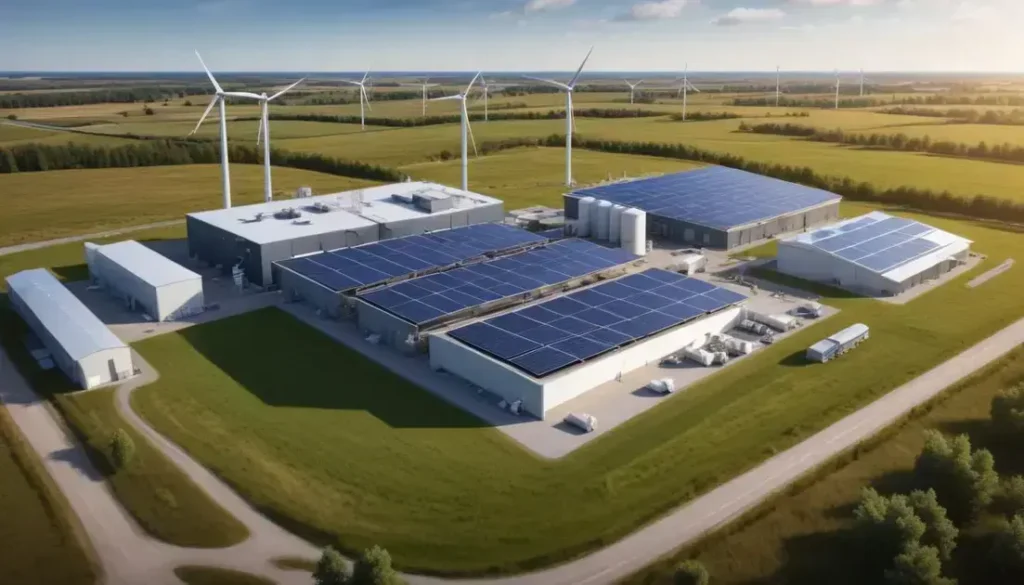Decarbonisation involves reducing carbon emissions through sustainable practices, such as adopting renewable energy technologies, enhancing supply chain transparency, and innovating in transportation solutions, which collectively drive environmental sustainability and open new opportunities for businesses.
The world is witnessing an urgent shift towards decarbonisation, and this trend is reshaping industries across the globe. Have you ever wondered how these strategies could impact Indian businesses?
Introduction to global decarbonisation strategies
Global decarbonisation strategies focus on reducing carbon emissions to combat climate change. These strategies are crucial for businesses worldwide as they navigate the transition to a low-carbon economy. Companies are increasingly adopting sustainable practices, such as enhancing energy efficiency and using renewable energy sources.
A major aspect of these strategies is the integration of supply chain transparency. Firms are urged to track their emissions throughout the supply chain, promoting accountability. This level of transparency not only helps in complying with regulations but also boosts customer confidence in sustainable practices.
Innovations in technology play a pivotal role in achieving decarbonisation goals. Many companies are investing in innovations like carbon capture and storage (CCS) systems. These technologies capture carbon dioxide emissions from industrial processes, preventing them from entering the atmosphere.
Furthermore, the shift towards green finance is reshaping investment landscapes. Financial institutions are prioritising investments in projects that contribute to decarbonisation efforts. This trend not only supports sustainable development goals but also presents new business opportunities in emerging sectors.
Importance of climate action
The importance of climate action cannot be overstated in today’s world. As the impacts of climate change become increasingly evident, both businesses and individuals must step up their efforts to mitigate these effects. Taking action today is crucial for ensuring a sustainable future for upcoming generations.
One of the primary reasons climate action is vital is its role in reducing greenhouse gas emissions. By adopting sustainable practices, industries can significantly lower their carbon footprints, contributing to global efforts to cap temperature rises. This is essential not only for the environment but also for long-term economic stability.
Collaboration across sectors is key to effective climate action. Governments, corporations, and civil societies must work together to create comprehensive policies and initiatives. Such partnerships can lead to innovative solutions and best practices that drive change on a larger scale.
Moreover, the shift towards a greener economy can unlock new business opportunities. Companies that embrace sustainability often find themselves at a competitive advantage, attracting environmentally conscious consumers and investors. In addition, investing in clean technologies can lead to significant cost savings in the long run.
Insights from Sustainability LIVE London 2025
The Sustainability LIVE London 2025 event will gather leaders and innovators from various sectors to discuss transformative environmental practices. This platform aims to share valuable insights and trends shaping sustainable development worldwide. Participants will engage in discussions about emerging technologies and strategies that can drive decarbonisation.
Keynote speakers will address crucial topics such as circular economy principles, waste management innovations, and renewable energy advancements. Their expertise will provide attendees with practical solutions for implementing sustainable practices in their organisations. Learning from these industry experts can empower businesses to enhance their sustainability efforts.
Moreover, the event will highlight successful case studies from companies that have effectively integrated sustainability into their operations. These real-world examples can serve as blueprints for others aiming to embark on their sustainability journeys. Discovering how these enterprises tackled challenges and leveraged opportunities can provide valuable lessons.
Workshops and interactive sessions will also be a key feature, fostering collaboration and networking among participants. These sessions will encourage brainstorming and sharing experiences, creating a community focused on sustainability. Attendees will leave with actionable insights and a stronger network of like-minded individuals committed to driving change.
Keynote speakers and topics
The upcoming event will feature prominent keynote speakers who are pioneers in the field of sustainability. These experts will share their insights on a variety of critical topics that are shaping the future of our environment and industries. Attendees can expect to hear from thought leaders who have demonstrated success in implementing sustainable practices.
One focal area will be the integration of renewable energy sources. Speakers will discuss advancements in solar, wind, and other alternative energies, highlighting successful projects and innovations that are driving change globally. Understanding these trends is essential for businesses looking to transition to greener operations.
Another significant topic will be the importance of sustainable supply chains. Keynote speakers will delve into strategies that enhance transparency and reduce environmental impact, showcasing case studies from companies that have successfully transformed their supply chains.
Moreover, discussions will include exploring innovative technologies that support sustainable practices. From carbon capture solutions to energy-efficient processes, these insights can empower attendees to adopt new technologies in their business practices effectively. The knowledge gained from these speakers can play a crucial role in guiding organisations towards achieving their sustainability goals.
Regional approaches and collaborations
Regional approaches to sustainability are gaining traction as cities and countries recognise the necessity for collaborative efforts. By leveraging local knowledge and resources, regions can implement tailored strategies that address specific environmental challenges. For instance, some areas are focusing on sustainable agriculture practices that conserve water and improve soil health.
Collaborations between governments, businesses, and non-profits play a crucial role in these initiatives. These partnerships often lead to the sharing of best practices and resources, enabling regions to develop comprehensive sustainability plans. For example, joint efforts in renewable energy projects can optimise investments and accelerate the transition to a clean energy future.
In addition, regional coalitions can advocate for environmentally friendly policies at national levels, ensuring that local voices are heard in larger legislative processes. This grassroots involvement can enhance the effectiveness of environmental regulations and increase public support for sustainable development.
Moreover, engaging local communities fosters greater awareness and participation in sustainability initiatives. By involving residents in planning and decision-making, regions can ensure that strategies reflect the needs and values of their populations. This inclusive approach not only strengthens community ties but also enhances the overall impact of sustainability efforts.
Innovations in decarbonisation
Innovations in decarbonisation are essential for addressing climate change and promoting sustainable development. Various sectors are embracing cutting-edge technologies to effectively reduce carbon emissions. One notable example is carbon capture and storage (CCS), which enables industries to capture greenhouse gases before they enter the atmosphere. This technology is becoming increasingly vital in heavy industries such as cement and steel.
Furthermore, advancements in renewable energy technologies are transforming how we generate power. Innovations in solar panels, wind turbines, and energy storage solutions allow for more efficient and cost-effective energy production. These developments make it easier for businesses and households to transition to clean energy sources.
Moreover, the emergence of sustainable transportation solutions has greatly contributed to decarbonisation efforts. Electric vehicles (EVs), hydrogen fuel cells, and advancements in public transport systems help reduce reliance on fossil fuels and lower urban emissions. Cities are increasingly investing in infrastructure to support these eco-friendly transport options.
Finally, utilising digital technologies like artificial intelligence can optimize energy consumption and emissions tracking. Smart grids and energy management systems enable real-time monitoring, helping organisations make informed decisions about their energy use and emissions reduction strategies.
Challenges faced by businesses
Businesses today face numerous challenges on their journey towards sustainability and decarbonisation. One major obstacle is the high initial investment required for adopting green technologies. Many companies hesitate to allocate significant funds for renewable energy infrastructure, carbon capture systems, or energy-efficient equipment, fearing a long payback period.
Additionally, the lack of regulatory clarity can hinder sustainability efforts. With varying environmental regulations across regions, businesses often struggle to navigate compliance requirements. This uncertainty can deter companies from making long-term investments in sustainable practices, as they may not be sure which regulations will persist.
Another pressing issue is the skills gap in the workforce. As companies move towards innovative sustainable solutions, there is a growing need for employees who possess knowledge in areas like renewable energy, sustainability reporting, and green technology. The shortage of skilled workers can slow down progress and increase operational costs.
Furthermore, supply chain complexities pose a significant challenge. Sourcing sustainable materials while maintaining cost efficiency is often difficult. Businesses must balance consumer demand for sustainable products with the realities of current supply chain limitations, creating a tension between sustainability goals and profitability.
Opportunities for Indian exporters
Indian exporters are poised to benefit significantly from the global shift towards sustainability and decarbonisation. With many countries implementing stringent environmental regulations, there is a rising demand for sustainable products and services. This trend presents a unique opportunity for Indian businesses to tap into international markets that prioritize eco-friendly solutions.
One of the key areas where Indian exporters can excel is in renewable energy technologies. As nations invest heavily in solar, wind, and other forms of clean energy, Indian companies that produce related components, such as solar panels and wind turbines, can find lucrative markets abroad. Enhancing production capacities will enable these firms to meet the growing global demand.
Additionally, the emphasis on sustainable agriculture offers immense opportunities. Indian exporters can promote organic and sustainably sourced agricultural products, catering to consumers who are increasingly health-conscious and environmentally aware. By adopting sustainable farming practices, Indian farmers can not only enhance their product quality but also tap into premium markets.
Moreover, Indian businesses can leverage technological innovations in logistics and supply chain management to reduce their carbon footprint. This initiative can make them more competitive in global markets where sustainability is a key decision-making factor. By showcasing their commitment to sustainability, Indian exporters can build stronger brand loyalty among consumers who prioritize ethical purchasing.
Conclusion and call to action
In light of the pressing challenges posed by climate change, it is imperative for businesses and individuals alike to actively engage in sustainable practices. The benefits of committing to decarbonisation and sustainability extend beyond environmental impact; they also encompass economic and social advantages. Companies that embrace green initiatives often find that they improve their brand image and attract a loyal customer base that values ethics.
Moreover, the transition to sustainable practices presents numerous opportunities for innovation and growth. From renewable energy technologies to sustainable agriculture, the fields are vast and varied. Engaging in these areas not only positions businesses as leaders in their industries but also contributes to a healthier planet.
As we look to the future, it’s essential for stakeholders at all levels to take concrete steps towards sustainability. Educational initiatives can empower communities, and collaborative efforts can drive progress on a larger scale. It’s time to unite our forces for a greener tomorrow.
By prioritising sustainability, you can make a meaningful contribution to the environment and the economy. Whether you are a business leader, an employee, or a consumer, your choices can lead the way in fostering a sustainable future. Take action today and be a part of the solution for a better, more sustainable world.
Embracing Sustainability for a Better Future
As we conclude, it is clear that adopting sustainable practices is crucial for both the environment and businesses alike. By taking action towards decarbonisation, organisations can not only contribute to the fight against climate change but also enhance their market position.
Businesses that engage in sustainability often see benefits in brand loyalty, customer satisfaction, and cost savings. They help pave the way for a healthier planet. These efforts open up exciting opportunities for innovation, allowing companies to thrive in a competitive environment.
Everyone has a role to play in this journey. Consumers can make mindful choices, while businesses can lead through effective sustainability strategies. When we unite for a common purpose, we can create a lasting impact.
Thus, let us embrace sustainability together and commit to actions that foster a greener future for generations to come.
Frequently Asked Questions
What are the main benefits of adopting sustainable practices for businesses?
Adopting sustainable practices can enhance a company’s brand image, attract environmentally conscious customers, and lead to cost savings through reduced energy consumption and waste management.
How can Indian exporters leverage global sustainability trends?
Indian exporters can tap into the rising demand for sustainable products by offering eco-friendly goods, such as organic agricultural products and renewable energy technologies.
What challenges do businesses face in implementing sustainability measures?
The main challenges include high initial investment costs, lack of regulatory clarity, skills gaps in the workforce, and complexities in sourcing sustainable materials.
How can technology assist in decarbonisation efforts?
Technological innovations, such as carbon capture systems, renewable energy solutions, and digital energy management tools, can optimize energy consumption and help businesses track their carbon footprint effectively.
What role do consumers play in promoting sustainability?
Consumers can support sustainability by choosing eco-friendly products, advocating for transparent business practices, and participating in community initiatives aimed at environmental preservation.
Why is collaboration important for sustainability initiatives?
Collaboration brings together diverse expertise, resources, and knowledge, enabling participants to implement more effective sustainability strategies and drive change on a larger scale.


